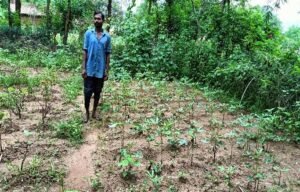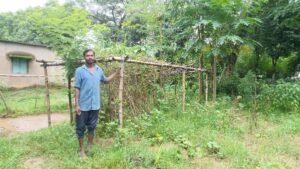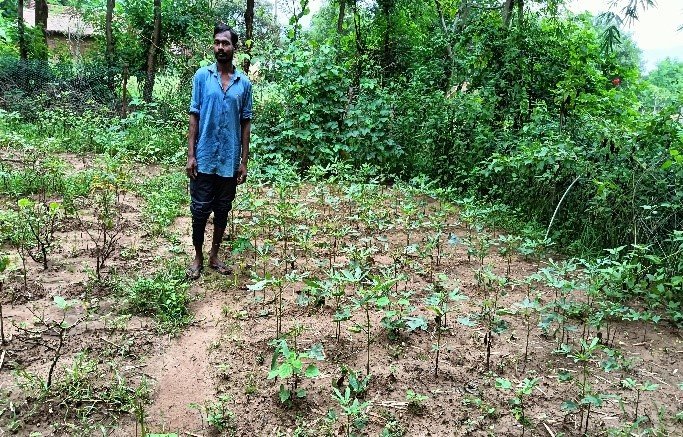The Journey of Raju Kada Towards Self-Reliance through a Kitchen Garden
Introduction:
Raju Kada, a resident of Baria village under Jashipur block, is a smallholder farmer with a family of four, including his son, daughter-in-law, and daughter. He owns 1.5 acres of land, which he previously used only for paddy cultivation. Other than that, the land remained underutilized. To meet the daily vegetable needs of the household, his family relied entirely on the local market. This not only led to increased household expenses but also exposed the family to the risks of consuming chemically grown vegetables.

Turning Point:
community mobilizer (Didi) from Sambandh met Raju and discussed the concept and benefits of a kitchen garden. She explained the health hazards of market-bought vegetables and highlighted the nutritional and economic advantages of growing vegetables at home. Seeing the small patch of 0.1 acre near his house, she encouraged Raju to convert it into a kitchen garden.
With the support of Sambandh, Raju received assistance in the form of seeds, saplings, fencing materials, and training on preparing organic compost and using organic methods. This motivated him to begin work on his own kitchen garden.
Progress and Expansion:
After the training, Raju initiated his kitchen garden on the land adjacent to his house. He began growing a variety of seasonal vegetables based on the climate and cropping pattern. Over time, his garden flourished and started providing enough vegetables to meet his family’s daily needs. This reduced his dependency on market-purchased vegetables and significantly saved household expenses.
Moreover, the surplus vegetables were sold in the nearby market, earning him an additional monthly income of ₹1500–₹2000. This income became a crucial financial support for the family.
Diversity and Sustainability:
Raju grows at least 15 varieties of vegetables every season. He also planted fruit-bearing trees like papaya, lemon, moringa (drumstick), and fig around the garden. To ensure year-round availability of produce, he also cultivated climbers like ridge gourd and beans using bamboo support structures. His use of organic compost and sustainable practices has further improved the soil health and productivity of the land.

Community Impact:
Raju’s kitchen garden has become a model for others in the village. Many neighbors visit his garden, appreciate his efforts, and are inspired to replicate the same in their own homes. His initiative has triggered awareness in the community regarding health, nutrition, and self-reliance.
Conclusion:
Raju Kada’s journey from a mono-crop farmer to a self-reliant grower of diverse vegetables is a powerful example of how small initiatives, supported by proper guidance and training, can bring long-term benefits. His kitchen garden not only provides nutritious food for his family but also generates regular income, empowers him financially, and inspires the community towards sustainable living. His story proves that with determination and the right support, even a small piece of land can transform lives.




Leave a Reply